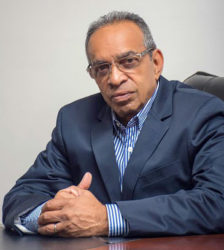The Private Sector Commission (PSC) remains optimistic that government will change its mind and sit down with several groups that have proposed a meeting and discuss Budget 2017 to find a consensus on measures proposed.
“We want to have a discussion with a way forward, what we can work with, what we can’t and so forth and this is outside of parliament,” President of the PSC, Eddie Boyer told Stabroek News yesterday.
“It is not too late and besides what Prime Minister (Moses Nagamootoo) thinks, we don’t agree with that, because we see this as an opportunity for unity. Nothing is too late. So we are appealing, we will continue to call for this meeting,” he added.
On December 9th last, the PSC, the Trades Union Congress (TUC) and the Federation of Independent Trade Unions of Guyana (FITUG) wrote to Nagamootoo (Leader of the House for Government Business), Dr Barton Scotland (Speaker) and Bharrat Jagdeo (Leader of the Opposition) seeking to have a meeting with the three to share opinions and highlight concerns about the budget.
Jagdeo has replied informing that he would be available for the meeting but there was no reply from the Prime Minister and Speaker.
Nagamootoo later told Stabroek News that while he is willing to engage with social partners such as the PSC and the trade unions, he does not find their request to have an engagement on the budget while it is being debated in the legislature appropriate.

“It is not an unwillingness to engage. Basically the timing is wrong. I don’t find it appropriate to have a parallel engagement on the budget,” he said on the sidelines of the consideration of the budget estimates in Parliament.
But Boyer says that he does not agree. “ Once they finished debating the budget and everything it is not law until the 1st of January, they can change anything and we are still hoping civility can take place where some of the taxes, some of the measures, VAT on electricity and water should be looked at again,” he asserted.
“We have not been able to meet with the Prime Minister or speaker but we are not looking to parliament specifically. We are looking to get the opposition and the government and the unions and civil society to look at a way forward. If they can justify what is in the budget, well then come and justify it at that forum. Tell people what are their expectations. There is a lot of talk but we want to let people know what is the position of the government, in terms of where the country is going,” he added.
The PSC President said that government should maximize the opportunity of speaking to stakeholders and also use the opposition’s willingness to meet to push for unity.
“The Private Sector is still hopeful that government will meet civil society – unions and the private sector – and we are calling them out that we should at least meet. Don’t they think this is a way forward? If the PPP say they want to meet, this is a way forward to have that kind of dialogue. Instead of the government saying the opposition don’t want to meet them, the opposition saying government don’t want to meet them, but now you have civil society, government and everyone. You have a social contract there, let them come and meet. That would be a good Christmas present for all.
Doctrine
The Prime Minister has said that Guyana’s system of government relies heavily on the doctrine of separation of powers and that since the executive has already laid the budget in the legislature the legislative process must be completed.
“I don’t know if they were expecting that we can truncate the process. There was a period before the budget was laid when consultation was encouraged however once it reaches the legislature only one of two things can happen that is, the budget is either approved or not approved.
There is no unwillingness to meet but we are involved in a grueling, unending process as we consider the estimates. Basically the timing is wrong,” he explained.
In their letter, which was released to the media, the groups cited a range of provisions in the proposed budget that they have concerns over, including the new Value-Added Tax (VAT) and Pay As You Earn (PAYE) regimes, taxation on key services and the proposed garnishing of accounts of delinquent taxpayers by the Guyana Revenue Authority (GRA).
In addition to announcing the planned reduction of VAT from a rate of 16% to 14%, Finance Minister Winston Jordan also unveiled plans for the tax to be made applicable to monthly electricity and water consumption bills exceeding $10,000 and $1,500, respectively. The move to tax electricity and water has attracted widespread criticism.
Although they acknowledged that the APNU+AFC in its 2015 elections manifesto had committed to lowering the VAT, which they applauded, the three groups said they are concerned over the potential negative impact, both direct and indirect, on consumers, workers and citizens.
They also pointed to proposed new taxes on the utilities as well as healthcare and education and noted that these are areas vital to the development and wellbeing of the country. “Though it is not being disputed, the need to source funding for these, the concern is that the methodology being applied in achieving same may have adverse effects,” they added.
They also voiced concern over the removal of subsidies from the pension population, which was initiated in the administration’s inaugural budget last year.
The letter urged a “stay” on the planned amendment of the Income Tax Act to facilitate garnishment by the GRA, saying there should be further consultation and deliberation. The strong view held is this is unnecessary based on existing powers and rights of collection, they said, while adding that it is important to have the contention resolved.





